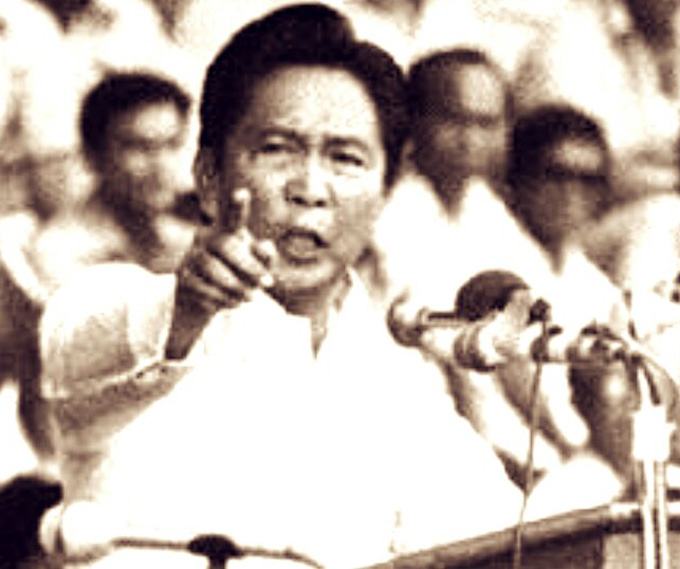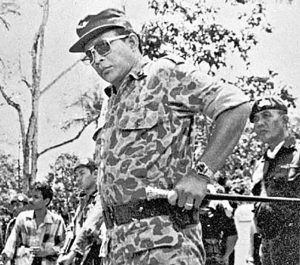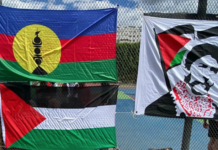
By Mong Palatino in Manila
Indonesia’s Golkar party wants former strongman General Suharto to be declared a national hero. In the Philippines, President-elect Rodrigo Duterte is in favor of burying the dictator Ferdinand Marcos in a heroes’ cemetery.
Supporters of Suharto and Marcos believe they deserve to be recognised as heroes in their respective countries but human rights groups insist the two leaders are dictators not worthy of emulation.

Suharto, known as the “Smiling General”, ruled the country for 32 years until a student-led uprising forced him to step down in 1998. He died ten years later.
In 2010, his name was floated as a possible nominee in the annual recognition of national heroes. It was not approved by the government but the proposal was revived again last year.
A government agency is studying the nomination but President Joko Widodo will have the final decision when he appoints new national heroes in November.
Supporters assert that Suharto’s leadership brought stability and prosperity in the country. When he was removed from power, Indonesia’s economy was already the biggest in Southeast Asia.
But critics accused Suharto of being an authoritarian leader who committed widespread atrocities to silence the opposition. He and his family are also known for plundering the nation’s wealth.
Misused state funds
Last year, the Supreme Court ordered Suharto’s family to pay $325 million after one of Suharto’s foundations was found guilty of misusing state funds to bankroll various business transactions.
During Suharto’s rise to power, more than half a million suspected communists and their sympathisers were allegedly killed and arrested by the military. There are various initiatives today which seek to determine the truth about this dark period in Indonesia’s modern history.
Meanwhile, in the Philippines, the proposal to bury Marcos in a heroes’ cemetery continues to be a divisive issue.
Like Suharto, Marcos ruled as a strongman for two decades until he was ousted by a peaceful “People Power” uprising in 1986. He declared Martial Law in 1972 to save the republic from the communist threat but his rivals think it was merely a ruse to extend his term.
Marcos is accused of using the military to intimidate the opposition. Thousands became victims of human rights violations such as torture, unlawful arrests, enforced disappearances, and extrajudicial killings.
Marcos is also known to have amassed ill-gotten properties which he entrusted to cronies and family members.
He died in 1989 in Hawaii. His body is interred in a private air conditioned mausoleum in his home province while his family continues to seek a hero’s burial in Manila.
‘Golden age’
Supporters of Marcos refer to the Martial Law years as the Philippines’ “golden age” because the country supposedly enjoyed peace and economic boom. They add that as a former World War II soldier and elected president, Marcos has the right to be buried in the heroes’ cemetery.
The newly-elected president endorses a hero’s burial for Marcos since it would lead to national healing and reconciliation. But outgoing President Benigno Aquino II rejects the proposal by emphasising that the heroes’ cemetery is “reserved for people worthy of praise and emulation”.
Suharto and Marcos died several years ago, but their legacy is still being debated. They were humiliated when they were ousted from power yet their names have undergone rehabilitation in recent years.
How did this happen? At least two factors are immediately apparent.
First, their subordinates and cronies are still influential in the bureaucracy. But second and equally importantly, those who succeeded them have failed to convincingly demonstrate to the people the effectiveness of a democratic system in delivering economic development and confronting remaining political and social challenges.
Things like poverty and political gridlock are still realities in both Indonesia and the Philippines, making many yearn for a time where decisive leadership can offer a quicker fix.
Meanwhile, supporters of Suharto and Marcos are happy to exploit public frustration to promote historical revisionism.
It is not simply enough to resist proposals recognising Suharto and Marcos as national heroes. The more important question that requires urgent answering is this: Why are an increasing number of Indonesians and Filipinos still open to naming both dictators as heroes?
Mong Palatino is a Diplomat columnist, regular blogger and Global Voices regional editor for Southeast Asia and Oceania. This is republished from The Diplomat with permission.











































